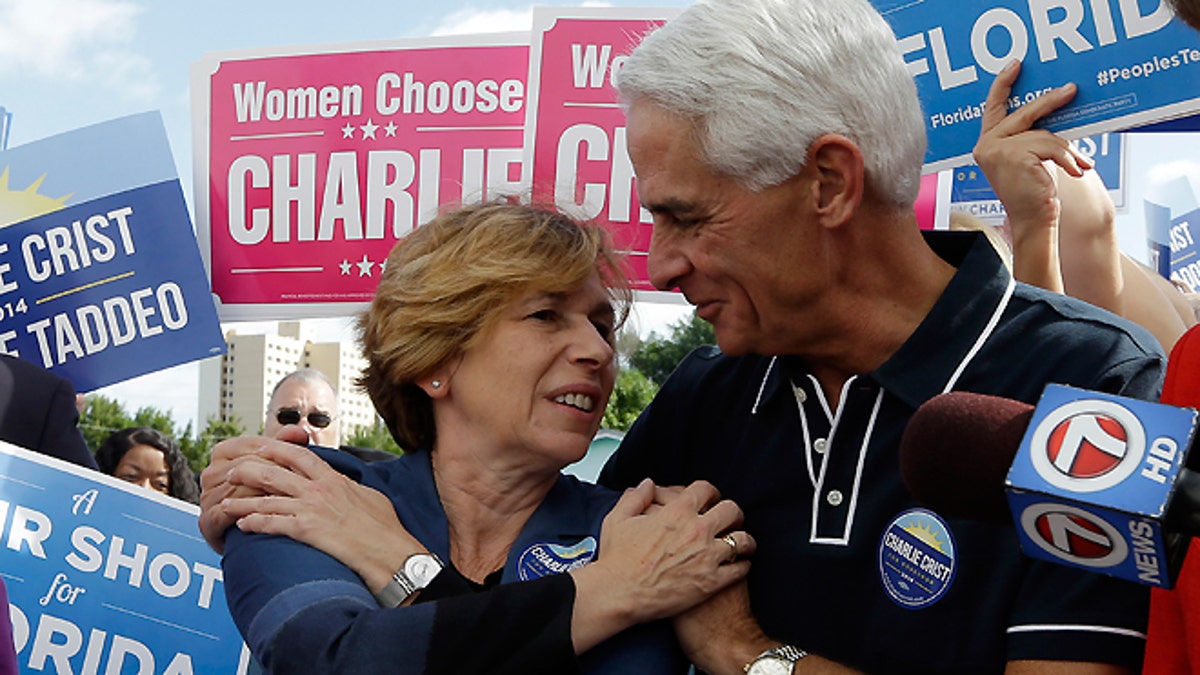
Nov. 3, 2014: Democratic gubernatorial candidate Charlie Crist, right, talks with Randi Weingarten, president of the American Federation of Teachers, left, as he campaigns at the International Brotherhood of Electrical Workers Hall, in Miami. (AP Photo/Lynne Sladky)
Forget about lobbyists skulking around Capitol Hill. This year’s election power players were hiding behind the schoolhouse.
American Federation of Teachers’ (AFT) President Randi Weingarten recently revealed that her union spent over $20 million on election campaigns this cycle in order to elect politicians who defend an indefensible status quo that she’s partly responsible for.
The other big teacher union, the National Education Association (NEA), pledged up to $60 million, making teacher unions among the biggest campaign contributors this election cycle.
[pullquote]
It may not be enough. A broad, bipartisan coalition has recognized the pressing need for commonsense education reform. Indeed, the number of bad teachers – protected by old-fashioned, union-backed tenure requirements – “shocks the conscience,” in the words of California Superior Court Judge Rolf M. Treu.
Last week’s Time magazine cover story documents how Silicon Valley luminaries are leading a diverse set of interest groups backing overdue education reform, beginning with amending teacher tenure rules. And on MSNBC last week, even former union leader and Democratic Mayor of Los Angeles Antonio Villaraigosa called the current education system “a national crisis.”
For good reason. American students now rank 17th internationally in reading, 20th in science, and 27th in math. They rank below their peers not only in developed countries, but also those in China and Russia and those in countries that most of them – evidently – couldn’t locate on a map, such as Slovenia, Estonia, and Vietnam.
Shop and tech classes, once a staple of American education, have been phased out in many states in favor of the liberal arts – at a time when the nation is crying out for graduates with hard skills. And progress towards teaching computer science, web design, and even Microsoft Excel is moving far too slowly, especially when compared with our Asian counterparts, who are reorienting their education systems around these 21st century skills.
Teacher unions have spent hundreds of millions of dollars obstructing reasonable reforms to “last in, first out” hiring policies, seniority-based pay, and teacher tenure that could improve the status quo that protects unions and incompetence in the classroom at the expense of students. In practice, this means quid pro quo agreements with political candidates where campaign contributions are traded for promises of an anti-reform agenda.
In fact, the NEA ranks fourth and the AFT thirteenth on the list of biggest overall campaign contributors of the last 25 years, according to the Center for Responsive Politics’ Open Secrets database. Incredibly according to Weingarten, such money in elections means that “the voices of everyday Americans… [get] squashed.” Presumably she is not referring to the 86 percent of Americans (according to one recent poll) who support commonsense education reform that are being stonewalled by teacher union influence.
And the union uses required dues money to support one side of the political spectrum, not reflecting the political makeup of union members. For example, in the 2012 election cycle, more than 90 percent of union campaign support went to fund Democrats, despite 40 percent of members of union households voting Republican.
Weingarten’s admonitions that “The avalanche of money spent on elections would be better spent… improving our neighborhood public schools” is particularly disingenuous. Perhaps she should start practicing what she’s preaching.








































